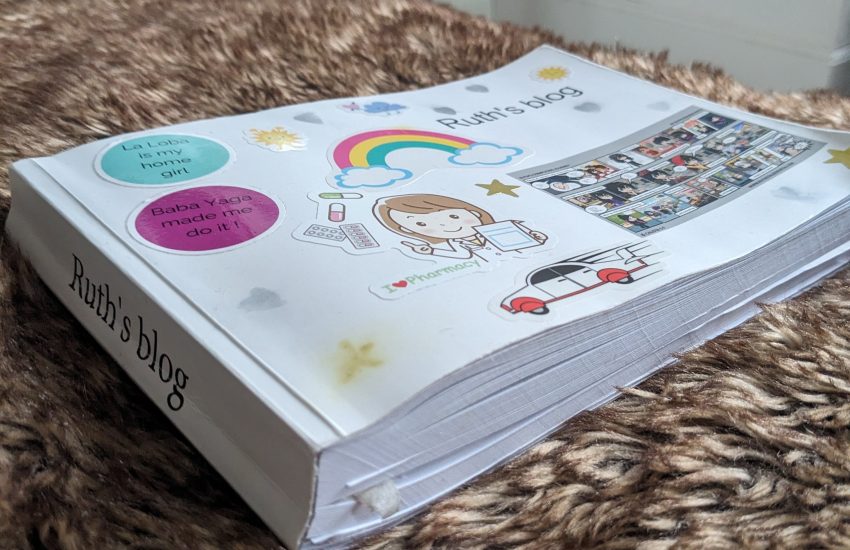I often reread my own blogs and have played around for sometime now trying to create a more readable version of this blog so that I could read it offline.
I played with various WordPress plugins and then just as I swore in the last blog I didn’t need WordPress anymore and I was going to turn this whole blog into a static site, I discovered the WordPress plugin: Print my blog, which is fantastic. With it, it is possible to put in a range of dates, or tags, or categories, to print out whatever selections of blogs you wish to turn into a document.
I chose everything without comments in a chronological order which generated a 343,000-word .pdf going from 2007 to present day.
At first I thought it would be enough to read that on my Kindle, but it wasn’t. It was laborious to go through such a big file electronically without chapters, a table of contents and an index.
So I decided I would pull it all into LaTex but after thinking about how this involved marking up a lot of the text so that LaTex could generate an index and a table of contents, I decided against it. I would have also had to decide on how to physically divide up the text in order to create chapters. Should this be by topic? By date? By year? By blog series? Again because there’s such much text, I didn’t know where to begin.
It was then I decided to just get a physical printed copy and treat it more like a reference text. So, I went back to the print my blog plugin and chose a two column layout which halved the number of pages. Then, I went exploring to see how I could get that into print.
I was momentarily tempted by companies which make blog books of glossy pics in a coffee table book format as that seemed quite a satisfying idea. However, I don’t own a coffee table, as they just seem like things to bang my knees on and get bruises, and because of the amount of words, I would have needed three volumes and a budget of at least £300. Now I love writing and reading my blogs as much, if not more, as the next blogger, but that seemed a bit keen even for me. So after more investigation, I chose doxdirect.com and was able to get all the words into an A5 glue bound paperback of 366 pages printed and delivered to my door for under £40.
It arrived just before Christmas and I have loved it ever since. It is chunky and satisfying in my hands and I have carried it about with me slowly rereading everything I have ever written here.
As I was rereading it, I started categorising the blogs: by year, by topic, by blog series, by title, by top blogs as I compile those each year, and by pingbacks – the blogs me and others have referenced the most. I made tables of contents for certain years and tags and keywords. I guess I could say that I have created my own offline linked data version.
And, now because I love thinking about data and meaning, I will either download or write some code to do a bit machine learning to see what it can generate, if it can give me anymore insight from analysing these complete works, so that I can compare it to what I have gotten myself.
I looked up what ‘complete works’ means and it says on Wikipedia: A Complete Works is a […] published edition of a text corpus […] normally accompanied with additional information and critical apparatus.
I guess the text corpus is what humanities students put into concordancers in order to see how often words turn up in text and how they are used along with other words. In my case I am more interested in the semiotics or gist of my words rather than the semantics, and since none of it has ever existed in any other format, it won’t be needing the critical apparatus which accompanies any complete works to help diligent readers and scholars understand what the original version said.
I guess I am the only diligent reader and scholar, though academics regularly reference certain blogs on here which is jolly nice.
As I’ve said before, I often admired the chutzpah of Muriel Spark keeping an archive until I read that it was for her to prove who she was and to have evidence of her experiences. In the same blog I said that nowadays we all have a similar archive of journeys made, appointments kept and so on.
As interesting as I find having data collected on my behalf, it is not the same as having a repository of writing, because in writing we capture the way we felt or what we thought and believed, data is just data – it doesn’t have any meaning until we assign it. Writing has the meaning we imbue in it as we explain our feelings, thoughts and beliefs. As we grow, our feelings, thoughts and beliefs can change, so it is nice to be able to look back and ponder.
I have called it the complete works, as every so often I think I have nothing left to say, I drop the mike and get off the stage of my blog never to return, but then I do. Never say never. I am sure there’s more where this all came from, as I love to think about HCI, perhaps enough for a volume two. Who knows?
For now I am just enjoying the physicality of this book in my hands, and the joy of having figured out what I wanted to say that very first day when I set up my blog back in 2007 – it only took me 343,000 words.






